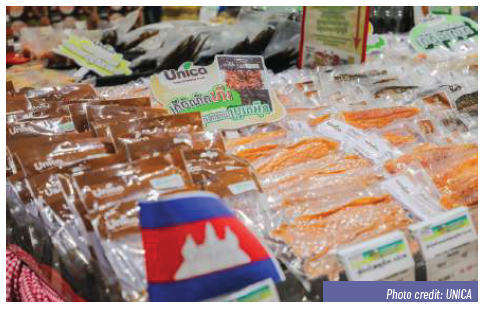Industry Profile: MARY LEP
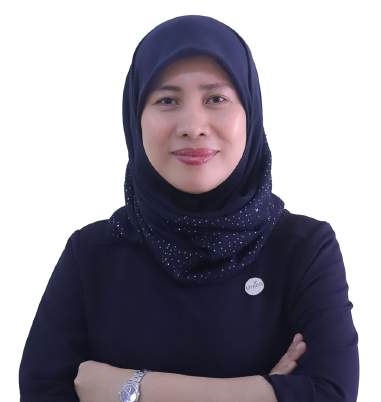
(Cambodia)
Q:What does UNICA produce and how do you obtain the raw materials for processing? Where are the end-products marketed and who are the main consumers?
A: UNICA produces many products like dried fish, fish paste, fish fillets, and smoked fish. We get our raw materials from small-scale fishers around Tonle Sap Lake and other fishing communities in Cambodia. These fishers give us fresh fish and semi-processed fishery products, which we turn into our quality products. Our sales volume has increased around 20% to 25% every year.
Our products are marketed both locally and internationally. In Cambodia, you can find our products in local markets, supermarkets, and stores like Greenat Stores, Makro market and Lucky Supermarket. We are also talking to the AEON retail group and looking into export markets in New Zealand. Our main consumers are mid- to high-income people who like convenience and quality. Our products are perfect for busy households that want healthy and easy-to-make and ready-to-eat food.
Q:Would it be correct to say that 2021 marked a turning point for UNICA when it was chosen as one of the beneficiaries of the European Union-funded CAPFISHCapture project1 which is implemented by the Fisheries Administration of Cambodia (FiA) and the United Nations Industrial Development Organization (UNIDO)? What did you hope to achieve when you applied for project support?
A: Yes, it would be correct to say that 2021 marked a turning point for UNICA when it was chosen as one of the beneficiaries of the CAPFISH-Capture project, implemented by the FiA and UNIDO. When I applied for project support, my primary goal was to enhance UNICA’s business operations, improve food safety standards, and expand our market reach. The support from CAPFISHCapture has been instrumental in achieving these objectives, allowing us to upgrade our equipment, receive technical training, and achieve certifications that have significantly boosted our competitiveness and market access.
Q:Could you elaborate on how taking part in the project has helped to strengthen UNICA’s production and market activities throughout the value chain?
A: Participating in the CAPFISH-Capture project has significantly strengthened UNICA’s production and market activities throughout the value chain. The project has helped us implement an Internal Control System (ICS) and achieve the Cambodia Quality Seal (CQS) certification, ensuring that our products meet high food safety standards; and has also provided fish processing equipment to boost productivity. This has increased our sales by 20% and expanded our markets to include six new buyers. We have increased jobs at UNICA by 50%, and all the new positions are held by women.
Additionally, the project has supported the development and implementation of an innovative value chain model, which has significantly strengthened cooperation with our value chain partners. This collaboration has enabled us to enhance their facilities and product quality to meet market requirements. The project has also facilitated comprehensive capacity development in business, technical, and food safety aspects, ensuring that our value chain partners are well-equipped to thrive in competitive markets.
Finally, the project along with national universities, has supported the development of new products, such as fish jerky and smoked fish, which have been well-received by consumers. It has also created jobs for women and communities involved in fish processing, contributing to economic growth and gender equality.
Overall, the CAPFISH-Capture project has been instrumental in enhancing UNICA’s competitiveness and market access, while also promoting sustainable and inclusive growth in the fisheries sector.
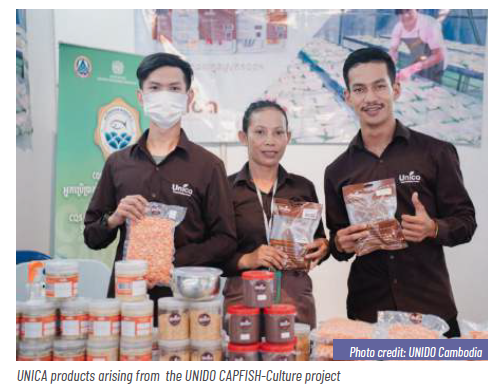
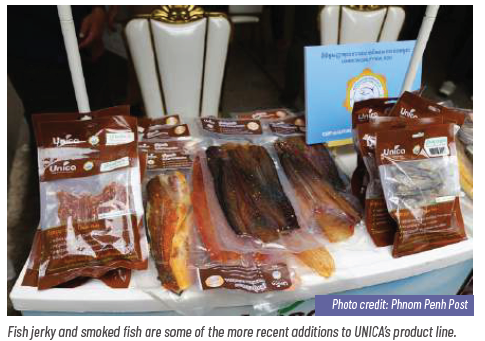
• Provide technical training to improve production practices and meet international standards;
• Enhance coordination among stakeholders to streamline processes;
• Facilitate investments in infrastructure upgrades and provide financial support for modernising facilities and improving equipment;
• Promote partnerships between small-scale processors and larger enterprises;
• Continue policy reforms to create a more enabling environment for Cambodian agrifood businesses; and
• Adopt a digital traceability system to help consumers and supply chain partners identify product sources.
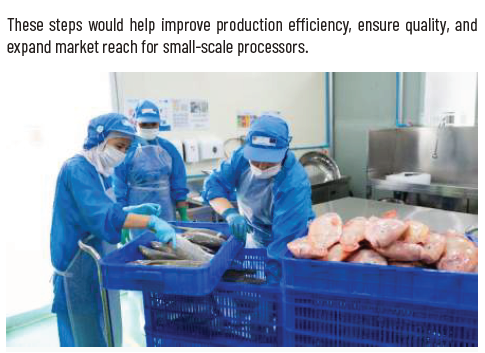
Q: And on a personal note, as you look back at UNICA’s journey since its founding in 2014, would you have done things differently in light of the lessons learned through the years? What do you hope to achieve in the next five years?
A: Reflecting on UNICA’s journey since 2014, we’ve made significant progress, especially in empowering women and expanding our market reach. While I wouldn’t change our core mission, I would have prioritised the promotion of ready-to-eat products, building partnerships with value chain partners and securing resources earlier. In the next five years I aim to achieve HACCP certification, expand into international markets, and continue supporting small-scale producers, particularly women-led entities, through capacitybuilding initiatives and cooperation.
